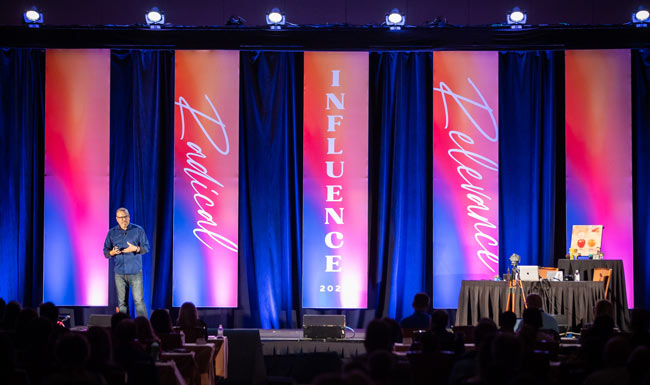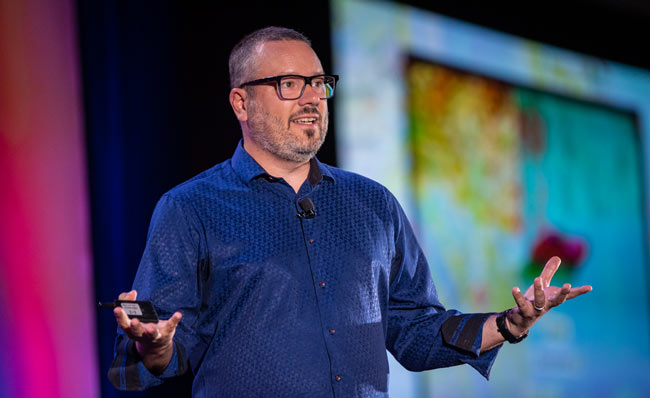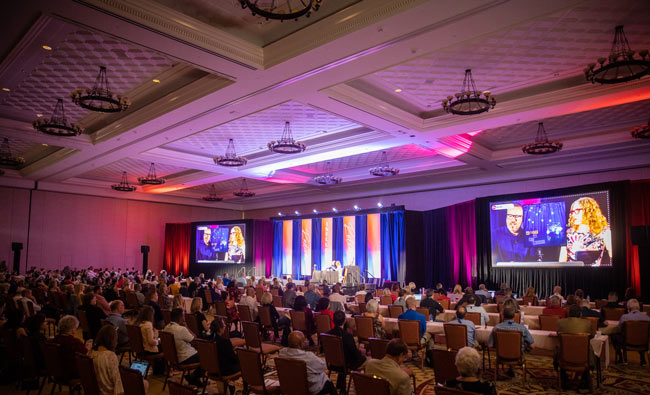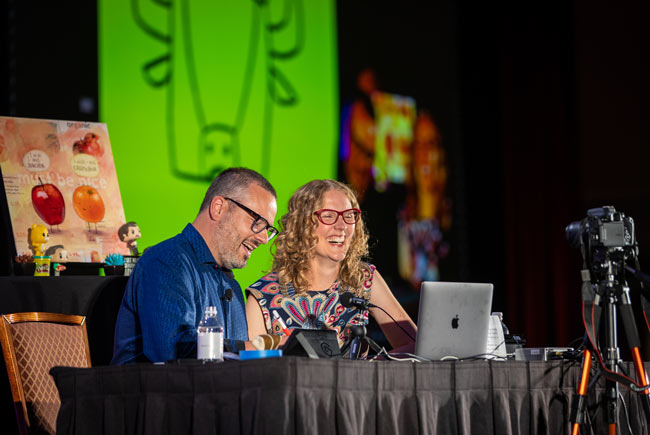
I recently gave the most nerve-wracking talk of my life. It was in front of my peers, at the national conference for professional speakers. It’s sort of like performing open-heart surgery on another heart surgeon while hundreds and hundreds of other heart surgeons watch.
In other words, tough crowd.
At my first convention fifteen years earlier, I was awestruck by the speakers on the main stage. They were polished, poised, and really, really good. I decided then and there I wanted to be on that stage someday.
This past July, I had my chance.
The theme was Radical Relevance, and Kim and I were selected to kick off the conference partially because of the pivots we made while navigating the pandemic.

My goal was to craft a revolutionary talk, one that would be talked about for decades. I envisioned the speech starting out with just me on stage, demonstrating what I did pre-pandemic. And then in dramatic fashion, the spotlight would shift to a set that was modeled after our virtual in-home studio. I’d walk over as Kim joined me on stage to exhibit our professional pivot in front of a live studio audience, simultaneously broadcasting to the virtual attendees at home.
Creative. Different. Daring.
And great in theory, but at rehearsal, things began falling apart fast.
I was already concerned that our presentation had too many things that could go wrong. Well, the day before the biggest speech of my life, they were all going wrong.
I always prefer to rely less on technology, not more, but we’d decided to replicate our in-house set on stage. It involved a fancy DSLR camera on a tripod, my iPad, and more dongles than a herd of milking cows. I was hopeful that since we were the first speakers on the program, we’d be able to get everything set up and perfectly arranged beforehand, allowing us to have some time to collect ourselves and concentrate on giving a great presentation.
Nope.
First, we learned we’d only have about four minutes to move everything on stage, set up the technology, and position the camera perfectly, because a gaggle of fake Elvises needed the whole stage to perform an opening number. (Hey, it was Vegas, after all.)
Then we learned that the lighting was set and unchangeable, so no dramatic spotlight moments.
No worries. We’re professionals; we can let that go.
Then came the soundcheck from hell.
You know how sometimes when you’re on a phone call, the sound gets wonky and you hear everything you just said a second or two after you say it? Annoying, right?
That’s what was happening during our soundcheck.
Not only is it impossible to string together anything longer than a sentence when that’s going on, but it’s also what our sound technician told us we could expect for the entirety of our joint presentation. “Yeah,” he said matter-of-factly. “Because we’re using Zoom to broadcast to the virtual audience and then piping that feed to the live audience, you’re going to hear that delay. There’s nothing we can do about it.”
Oh cool…Wait, what?!
I was running contingency plans through my head as Kim and I rehearsed part of our talk, but I was numb. It’s hard to imagine more of a nightmare scenario, short of having to perform naked. Rehearsal ended with me being extremely less confident than when I began, which is usually the opposite of what you’re hoping for.
As we walked back to our hotel room, I scrambled to add a few lifeboats to the Titanic. I seriously considered ditching the whole thing and just going out on stage with a microphone. No Kim. No set. No technological moving pieces.
One hundred percent dongle free.
I said as much to Kim, but then added, “And I’d end up regretting not trying for the rest of my life.” She agreed.
The rest of the day was spent controlling what I could. I strategized ways to move things on stage more quickly. I even started writing an alternative keynote in my head, in case it all erupted into a dumpster fire of bad audio and failed technology.
The backup speech was actually pretty good, too. If everything went up in flames, I pictured myself abruptly standing up from the set and addressing the audience with some real talk. I’d launch into a stirring speech about how it is our duty to push the envelope of our craft. But even if our efforts fail, we soldier on and make the best of it.
Because. We. Are. Professional. Speakers.
This dream scenario may or may not have included my colleagues erupting into thunderous applause, rushing the stage to carry me on their shoulders and parade me onto the Las Vegas strip and ending with me receiving the key to the city. It felt so real, I started to wonder if might not be an even better speech than the one I’d spent three months crafting.
But the pit in my stomach kept suggesting the very real possibility that this speech would be talked about for a generation, but for altogether different reasons than I’d hoped. I was pretty sure that I was on the verge of giving the biggest train wreck of a speech that the National Speakers Association had ever witnessed.
In reality, the hopeful nature of my alternative ending made me feel more comfortable, because it helped me believe that everything would be ok no matter what.
But the thing that squelched my doubts completely was a single, simple thought:
No matter what happens, at the end of today, you’ll still be married to your best friend, you’ll still have three amazing kids, and you’ll still be living in your dream house on Lake Michigan.
It was a truth bomb of perspective.
Suddenly, the pressure was off. My nerves were calmed. And I rested easy knowing that if worse came to worse, I could flee Las Vegas in shame, revoke my membership in NSA, and never have to see these people again.

As it turned out, the talk was a massive hit. We got set up in record time. Kim and I managed through the audio challenges without a hitch. The delay was tough, but it made us be more intentional about what we did say, making the speech more powerful. Plus it garnered the respect of our peers, who knew how difficult it was to pull off. The end of our speech was greeted with a rousing standing ovation. Many people told us it was the perfect way to start the conference as we emerged from the pandemic, and a catchphrase from our speech was echoed by almost every speaker after us.

I’m grateful for how things went and the kind response we received. My biggest takeaway? The reminder that most of the worst-case scenarios we face aren’t really worst-case scenarios at all.
Gratitude gives us the perspective to see things as they are. Taking stock of the blessings in my life and focusing on what really mattered helped me see the only thing truly being threatened was my pride and ego. And that made all the difference.
When we dare to stare down the monster under the bed, we discover that it shrinks.
When you hold your fears up to the light of gratitude, you can watch them melt away in the truth that you are more than your failures and stronger than you think.
And for Adultitis, that’s the ultimate worst-case scenario.
Curious to see the speech? Here it is, in its entirety:
And here’s a video version of this post: